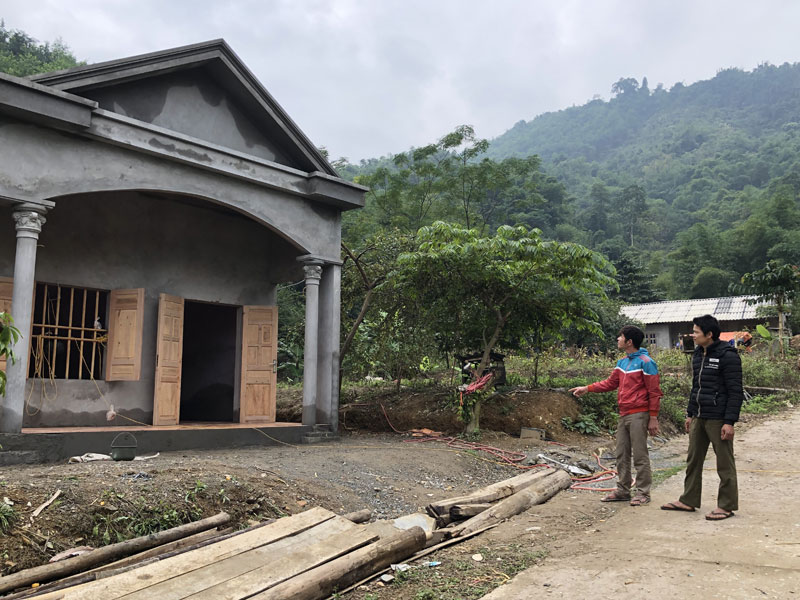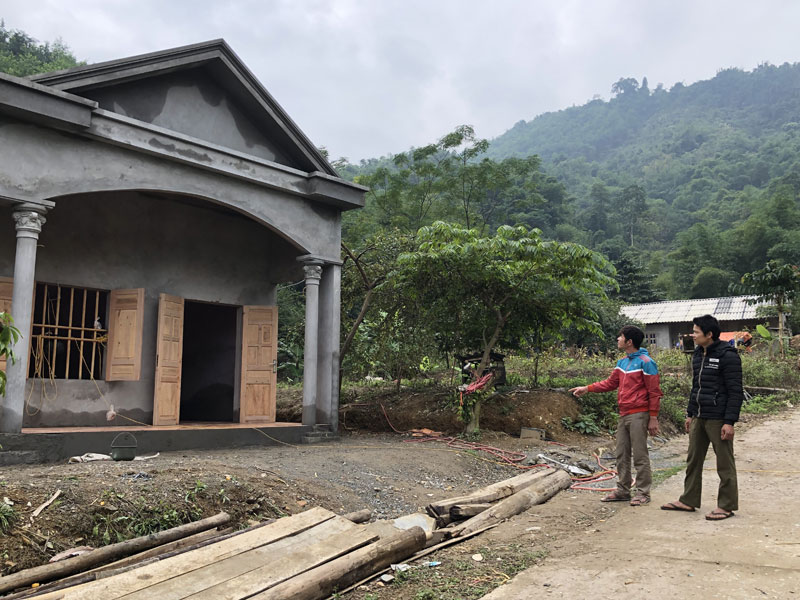
(HBO) – More than six years after moving to their new place, nearly 40 households in the resettlement area of Suoi Ke - Doi Ke in Mit villafe, Tu Ly commune of Da Bac district have gradually settled down.

Ly Van Huan's family in Mit village, Tu Ly
commune of Da Bac district has gradually settled down after more than six years
of living in Suoi Ke resettlement area.
"In the past, when I was living in Nhom
village, Dong Ruong commune, my family’s life was extremely precarious, because
it was an area at risk of landslides and flash floods in the rainy season. In
2012, with the encouragement and support of the Party and State as well as
local authorities and people, we moved to settle in the new area. Since then,
our material and spiritual lives have been getting better and better. Without
having to worry about flooding destroying our crops and house, we feel relieved
and motivated to develop production and take care of our family,” said Ly Van
Huan.
Huan’s family is one of the many households
that have increased their income in the resettlement areas. Dinh Ngoc Thai's
family with the income of over 24 million VND per year, and the family of Quach
Cong Thuan with over 60 million VND per year from pig breeding are other
examples. Since their moving in the new place, the new-comers’ life has
improved day by day. The entire residential area has been under planning, and
the main road leading to the commune concreted. Locals have accessed to clean
water, telecommunication service, and improved infrastructure works.
Ly Van Huong, head of Mit village in Tu Ly
commune said that the new residence is spacious but lacks production land.
Meanwhile, during the process of moving to the settlement area, the
compensation has yet to be completed, therefore, many households suffer a
shortage of capital to develop their production. However, locals in Doi Ke have
strived persistently to overcome difficulties. With the attention and support
of the province and local authorities, they have work hard to improve their
incomes. Some household have focused on animal husbandry and farming, while
others have developed carpentry or joined locally-based companies and
enterprises. Compared to the time they start residing in the locality, their average
per capita income have increased from 9 million VND per year to over 19 million
VND curretly./.
The emulation movement "Hoa Binh joining hands to build new-style rural areas” has been widely spreading, becoming a driving force that motivates the localities to renew rural landscapes and improve the material and spiritual lives of the residents. In this movement, the people play a central role-both as the main implementers and direct beneficiaries of its outcomes.
In response to the global digital revolution, Hoa Binh Newspaper is transforming itself into a modern and multi-platform media hub, blending cutting-edge technology with a restructured newsroom and a new generation of tech-savvy journalists.
Hoa Binh province’s Association of the Elderly recently held a conference to review the project on expanding the inter-generation self-help club model until 2025.
In a move to implement Resolution No. 57-NQ/TW, issued on December 22, 2024 by the Politburo, which targets breakthroughs in science-technology development, innovation, and digital transformation, the Hoa Binh provincial Department of Health has issued a plan to roll out the "Digital Literacy for All” campaign within the local health sector.
An Nghia Commune (Lạc Sơn District) is one of the communes that achieved the tha standard of the national new rural area in 2018. Entering a new development phase, the commune is now trying to meet the criteria for the advanced new rural development. With the strong political will and the public consensus, the commune is gradually overcoming the challenges to reach this goal, aiming for the sustainable development.



